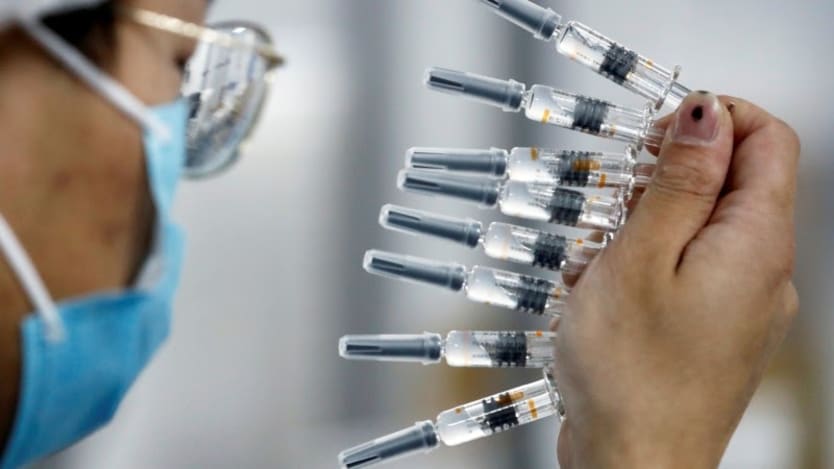
The Philippines regulatory authority has given emergency use authorization to the COVID-19 vaccine developed by Chinese biotech company, Sinovac. However, its recommendation to not use the vaccine among health care workers has sparked questions among health workers themselves.
The decision is based on data from the vaccine’s clinical trials in Brazil, where it was found to have an efficacy of only 50.4% when administered to health care workers exposed to COVID-19, said Eric Domingo, director-general of the Philippines’ Food and Drug Administration, on Monday during a televised briefing.
Sign up for Devex CheckUp
The must-read newsletter for exclusive global health news and insider insights.
If the vaccines will not be given to health care workers and elderly aged 60 and above, then it may be given to economic front-liners and soldiers, as well as poor people in the country, Presidential Spokesman Harry Roque said in a separate briefing.
A number of doctors and other health care professionals Devex has spoken to said they need more information on the trials, and are hoping to read more about it, which is a challenge since Sinovac is yet to publish results of its phase III clinical trials in a peer-reviewed journal. Some were accepting of the FDA’s decision, while others expressed concerns that this may create a misunderstanding with the public.
“You give the front-liners the best vaccines, but the other taxpayers do not deserve it?” asked Fitzgerald Carpio, a doctor at Westlake Medical Center, a private hospital in Laguna, a province south of Manila.
FDA recommendation
The national interagency task force managing the pandemic adopted expert recommendations in early February that prioritizes vaccination of health care workers, as well as vulnerable groups such as those aged 60 and above, and individuals with other medical conditions. At that time, Secretary of Health Francisco T. Duque III called on these priority groups to get the earliest available vaccines.
However, FDA recommends that the Sinovac vaccine, which may be the first to arrive in the country, only be administered to clinically healthy individuals aged 18 to 59 years old. Domingo said that based on clinical trial data, the vaccine has shown good efficacy rates of up to 91% for other members of the population, including office, factory, and construction workers who are not as highly exposed to COVID-19 as health care workers. It also has a good safety profile, and certified Halal by Indonesian authorities, which means it can be administered to Muslims.
There are over 6 million Muslims spread across the country in 2015, according to data published by the Philippine Statistics Authority.
The Philippines Department of Health said it will follow recommendations for each vaccine given emergency use authorization. The country’s national technical advisory group providing expert recommendations to the government on vaccines and immunizations convened Tuesday to issue operational guidelines.
Dr. Anna Bermudez, a front-line worker for a public hospital in the national capital, expressed her appreciation for the concern given by experts to protect front-line health care workers. But her worry is that it may send a wrong message to the public and create trust issues with the vaccine.
“This might cause misunderstanding among the public that others are more privileged and that they are being given a substandard product. It might also build distrust on the brand and their efficacy,” she said.
“As a health care worker, I would accept it because 50% protection is better than nothing at all. It might also boost vaccine confidence if we get it and others might follow,” she added.
In some countries, such as Hong Kong and Indonesia, leaders have taken the Sinovac vaccine in front of media to boost public confidence in the vaccine.
But other health care workers however would rather wait for other vaccine options with higher efficacy rates.
“I think in general health care workers want to be given the best option … out there. So if Sinovac doesn’t have the highest efficacy, I think it’s better to wait for the better one,” said Dr. Madelyn Sevilla, who works for a private hospital in the national capital.
A nurse who works for a public hospital in another city in the capital, who spoke on condition of anonymity, shared the same thoughts. She said the Sinovac vaccine is not the most ideal “as we are constantly exposed to the threat of the virus.”
While acknowledging that having a vaccine is better than none, Domingo said experts have concluded that the Sinovac vaccine is not the best option for the country’s front-line health workers. He added however that the authorization may be revisited, reviewed, and revised later on, as the Philippines receives more information from the vaccine’s ongoing clinical trials.
Arrival of vaccines
The Philippines is expecting to receive 600,000 doses of the Sinovac vaccine, in the form of a donation, from China by early March. The health ministry will also be purchasing a separate number of doses from the company separately.
The national regulatory authority has already given emergency authorization to Pfizer-BioNTech’s and AstraZeneca-Oxford’s COVID-19 vaccines. But the vaccines have yet to arrive in the country.
In a press briefing on Tuesday, Dr. Rabindra Abeyasinghe, WHO representative to the Philippines, said that while the Philippines has met all the requirements for the shipment of the AstraZeneca-Oxford vaccines, there have been some delays in finalizing requirements between Pfizer-BioNTech and the Philippine government.
“I've seen some communication last night, which now indicates that measures are being taken to address those issues. And we believe that the limited quantity of Pfizer-BioNTech vaccines will be shipped as early as possible,” he said.
He expressed optimism however that there will be information this week from COVAX regarding delivery dates of the AstraZeneca-Oxford vaccines to the Philippines.
The easing of lockdowns in the Philippines, which has suffered a large number of COVID-19 cases, second to Indonesia in Southeast Asia, is reliant on the arrival and rollout of COVID-19 vaccines.
The country currently registers a weekly average of over 1,700 cases of COVID-19, and a total death count of over 12,000. It has not yet started its vaccination campaign, although some members of Philippine President Rodrigo Duterte’s security aides already received a vaccine last year. The government has repeatedly pointed to the global shortage of vaccines as a reason for the delay.









